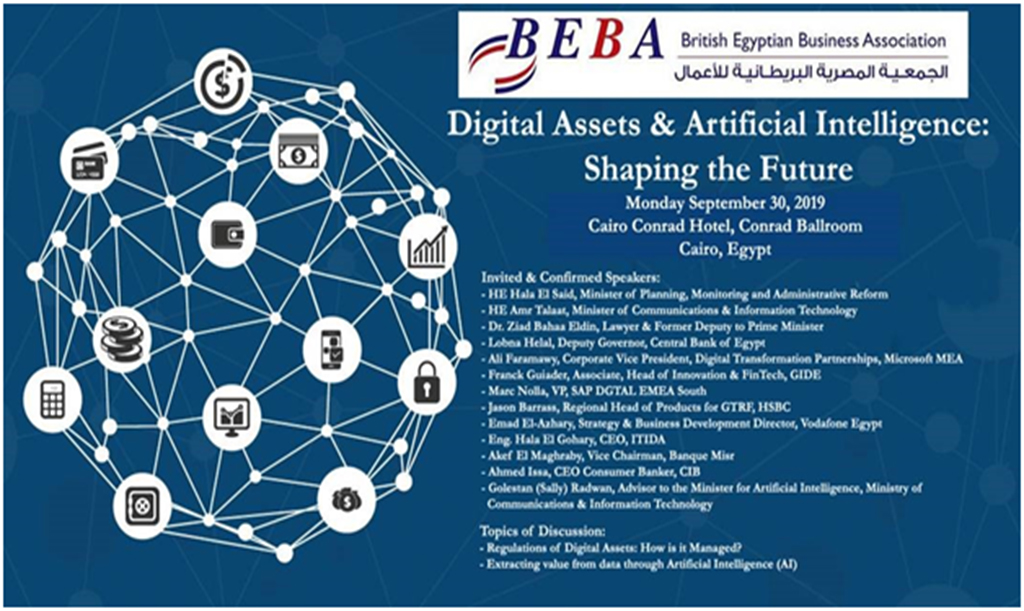How Digital Innovation can Transform the Future of Banks
13 January 2020
(FinTech Egypt – FinTechMagazine.com)
As we enter the second decade of the millennium, digital
innovation has never been more revolutionizing or relevant to financial
services and the banking sector. Financial institutions are continuously
developing digital strategies and incorporating them into traditional
processes, but the challenge here is to keep the pace and catch up with rapidly
developing consumer expectations.
Consumers today are flooded with innovative solutions from
FinTech startups and tech-centric companies, with each product or service
providing intuitive and easy-to-use interfaces while granting better security.
It’s a highly competitive medium that banks need to tackle with an innovative
approach, if they are to stay relevant and make a solid impact.
Emerging technologies are increasingly finding their way
into complex financial structures to provide a myriad of endless possibilities
in their application. The rapid development and adoption rates of trendy tech
like social media, cloud, big data and analytics, machine learning (ML) and
artificial intelligence (AI) are quickly enhancing processes and customer
experiences by delivering innovative methods of dealing with money. Banks need
to get on board and integrate these technologies into their strategy to meet
their short and long-term objectives.
With FinTech companies already gaining new ground in regards
to acquiring new customers and attracting bank-loyal ones, it’s now or never
for banks that are still resistant to explore the digital spectrum. The world
of digital finance is witnessing unique partnerships, mergers and acquisitions
between traditional banks and FinTech entities, where they establish mutually
beneficial relationships that allow FinTechs to get access to a wide database
of customers in addition to having a huge backbone represented by these FIs,
while FIs benefit from the innovative reach and creative practices that FinTech
companies can provide. These partnerships are actually more beneficial to banks
and similar institutions as they give them an instant boost into the digital
world with minimal efforts. They focus on their core capabilities while not
having to worry about the needs of the digital customer. For example, the tech
companies have innovation labs that focus on developing tailored solutions
through randomized controlled trials (RCTs), resulting in adding value and
increasing efficiency towards attaining their goals.
FinTech companies can also contribute to keeping banks aware
of tech-related regulatory and risk-oriented needs, with RegTech companies
popping up to serve this exact purpose. InsurTech agencies are also growing to
cater to insurance needs and concerns in the digital world. Big data is also an
area where tech firms can greatly support banks and FIs, resulting in a
critical aspect of personalization and an overall better quality of customer
experiences.
Ernst & Young released a survey that reported that 93% of
banks consider improving data quality as their biggest risk management priority
for the next three years.
There isn’t just a need for banks to evolve into the
digitization age, but there are clear benefits to that notion. FIs can safely
assume that their growth will be sustainable with the introduction of digital
services into their core offering, and by transforming their organizational
culture into a future-oriented one for the coming years. Leaders of the finance
industry need to reimagine their business models and adapt to a rapidly
changing ecosystem that is propelled into the future on the back of digital
entities.
Tags
Ernst & Young, InsurTech, RegTech, digital banks,
financial institutions, artificial intelligence, AI, machine learning, ML, social
media, big data
related articles

How FinTech is Revamping the Insurance Sector

Financial Health is What FinTech Should Be Empowering

Setting Digital Banking Transformation Priorities During a Pandemic

The State of Biometrics in 2020 and Beyond

Regulatory Technology is the Unsung Hero of Digital Transformation

Bridging the Digital Divide with APIs

The Impact of IoT on FinTech & Banking

How is Banking Changing with COVID-19?

Customer Service Transformation has become a must in a Digital World

How FinTech can relate to the Healthcare Industry

Humanizing Services through Smart Banking Technologies

MSME Lending & FinTech: What to Expect in 2020

Banking Experts Forecast Key FinTech Trends in 2020

How FinTech is Changing the Finance Industry.

6 FinTech Trends That Will Transform Banking In 2020

FinTech Trends To Keep An Eye On In 2020

How FinTech Can Contribute To Healthcare

How many digital Middle Eastern companies have unlocked their full innovative potential?

Top Five MENA Venture Capital Investments in Q3 2019

Singapore FinTech Festival 2019: A Meeting of the Minds

Digital Banking vs Physical Branches: Competition Not Mandatory

Central Bank of Egypt Holds Third Roundtable Discussion for FinTech in Egypt

BEBA presents the Digital Assets & Artificial Intelligence: Shaping the Future event

Five Technologies Expected to Reshape FinTech in 2020

3 FinTech Trends You Should Pay Attention To
.jpg)
Egypt’s First Artificial Intelligence Faculty launched at Kafr El Sheikh University


 0
0
 3.6k
3.6k 



Comments